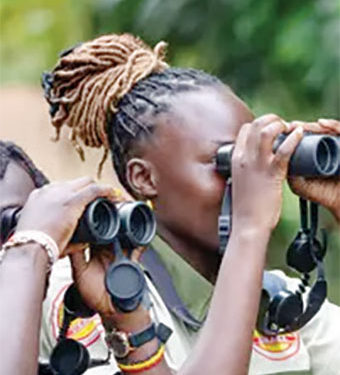By THE OBSERVER UG
On a Sunday morning on the shores of Lake Victoria, the cars and motorbikes arriving from Entebbe are laden with fishing gear.
The minibuses – matatus – full of market women and their big brown sacks of snacks and goods for sale follow closely behind. All whisk past a thin strip of grass that separates the lake from the asphalt. It is here that the boda bodas drop off keen birdwatchers, where century-old trees and vegetation make the perfect home for some of Uganda’s 1,100 bird species.
“We are here to break male dominance in the field of birding,” says Judith Mirembe, the chair of the Uganda Women Birders club, as the group reaches the botanical gardens on a day where the weather cannot decide between light rain and sunshine.
“There are very few female birders in Uganda. The tourism industry in general is yet to fully appreciate women,” she adds.
Two dozen women follow Mirembe in silence, hoping to spot a “lifer” – a bird on their wishlist.
“Everyone has a different lifer,” says Linda Nakalema, one of the club’s 80 members. “We see the red-chested cuckoo all the time in Uganda but people from South Africa are very excited when they see it because it only migrates there seasonally. It is their lifer. For others, it is the marabou stork that we see scavenging through our rubbish every day. It looks so elegant when it flies.”
Tour companies describe Uganda as a paradise for birdwatchers. About 50% of Africa’s bird species, and 11% of the world’s, are found here. Uganda has the highest concentration of birds in Africa. The country’s birders have an ambitious target of bringing in an annual $700m in tourist revenue by 2030. In 2019, tourism in Uganda generated about $1.37bn, about 3.6% of total GDP.
Mirembe believes that female birders are entitled to a share of these earnings. At the International Conference for Women Birders the club hosted in Uganda earlier this month, female bird enthusiasts from all over the world met to discuss their unique challenges and discuss how, together, they can bring more money to women in the sector.
“Birding is expensive and many Ugandan women are struggling to meet costs such as buying binoculars, telescopes and cameras to record and share the birds they sight with other people,” she says, adding that cultural expectations of women as caregivers mean their spouses may not let them go for week-long birdwatching tours.
“This is our reality. Even tourist operators do not take women seriously and we know that we must work twice as hard as men to get the same respect.”
Members of Uganda’s Women Birders club, which started in 2013, meet in Entebbe every Sunday. It is a training ground and a support network. Many of the women already have careers in tourism and wildlife. Others join to make new friends and learn.
After the satisfaction of spending hours looking for birds and the joy that reverberates through the group when someone sights, accurately names and describes a bird, the women sit down for lunch in a restaurant. Over smoked beef and matooke, they speak of a time when birding could be a hazardous pursuit for women.
People would see women with binoculars, accuse them of trying to steal land and beat them up. Others could be hostile to the women because they wore trousers – a taboo in some Ugandan cultures.
They recall tour operators who would send them to the field with drivers who would sexually harass them and tourist accommodation where the women would be put in a shared room with men.

“We look at people like Judith, who started before us and have made it despite the challenges, as an inspiration,” says Priscilla Apolot, a birder who works as a safari guide. For some women, such as Edith Namirembe, whose day job is rescuing snakes and other reptiles, birdwatching is a hobby. Others have plans to turn it into a full-time career.
“People mostly come into Uganda to see the big game such as the endangered mountain gorillas, tree-climbing lions, giraffes and elephants,” Apolot says.
“But nature is unpredictable, and you might fail to see these on some days. You might not find an elephant, but you may see a shoebill. The birds are always there. They are everywhere in Uganda. When you know your birds, your clients will always leave happy.”
Mirembe watches the younger enthusiasts with pride as she tells them how Uganda was the first country in Africa to start a female birders’ club, and how there are now similar associations in Rwanda and Kenya.
“We must not let fear hold us back from opportunity. We need to keep it going against all odds,” is Mirembe’s farewell cry, as the women leave the restaurant and head back into Entebbe alongside the tired beachgoers and weary market-sellers.
First published by The Guardian, UK






Discussion about this post